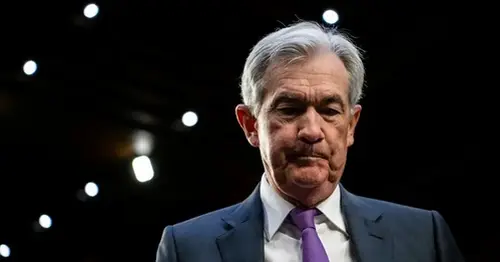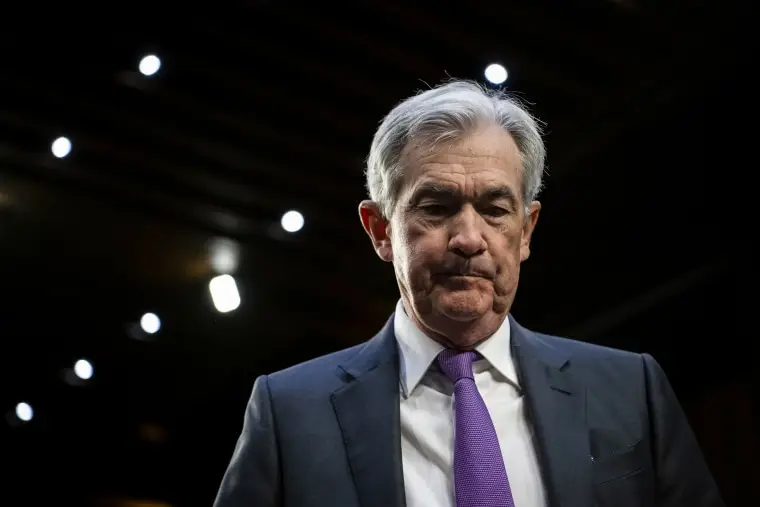
Federal Reserve pauses interest rate hikes for June as central bank evaluates the economy
The Federal Reserve said Wednesday it was keeping its key interest rate at about 5% — the first time it has kept the rate steady in more than a year.
The reason for the hold: Inflation appears to be finally easing, and the Fed wants to assess whether it has already raised rates high enough to tame price increases.

Yet the Fed also signaled rates could still go higher if inflation proves sticky.
"Inflation remains elevated," the Fed's Open Market Committee said Wednesday in a statement, adding it was prepared to adjust rates "if risks emerge that could impede the attainment of the Committee’s goal" of reaching a 2% inflation rate.
At the same time, the Fed also lowered its unemployment projections from 4.5% to 4.1%. The rate currently stands at 3.7%.
That means the Fed thinks it can continue to hike rates without causing mass job losses.
Amid prior soaring inflation readings, the Open Market Committee raised interest rates 10 consecutive times from March 2022 to this May.
But Tuesday, the Bureau of Labor Statistics announced that the 12-month inflation rate had fallen to 4% — the lowest reading in more than two years.
The impact of higher interest rates has been substantial, causing lending rates across the economy, from credit cards to corporate lending, to touch their highest levels in decades.
By making it more expensive to borrow and invest, the Fed has been working to slow the overall demand in the economy and thus reduce upward price pressure.
Inflation is indeed coming down — from a peak annual rate of more than 9% last June to 4% in May.
But that is still higher than the Federal Reserve's 2% target.
So even as the central bank looks to take a break from its interest rate hikes, it plans to tell businesses and consumers there are more increases to come.
Why interest rates may stay elevated for now
"The case to keep hiking remains strong," Neil Dutta, head of economic research at Renaissance Macroeconomics, a data and consultancy group, wrote in a note to clients Monday.
He noted that unemployment, at 3.7%, remains much lower than what the Fed has anticipated. Meanwhile, economic growth actually appears to be picking up, he said, citing a recent forecast from the International Monetary Fund.
What's more, bank lending, home prices and stock prices have all begun to increase again, he said.
At least one Fed official agrees there is no need to stop the interest rate bumps now.
“I don’t really see a compelling reason to pause — meaning wait until you get more evidence to decide what to do,” Loretta Mester, president of the Federal Reserve Bank of Cleveland, said last month in an interview with the Financial Times. “I would see more of a compelling case for bringing (rates) up.”
Making the case for a pause
Others disagree that the Fed needs to stay on its current pace of hiking, citing the fact that it often takes time for tighter monetary policy to take full effect in the economy.
"We have seen inflation continue to improve — the trend is lower," Angelo Kourkafas, investment strategist at Edward Jones, said in a phone interview.
In addition to an apparent slowdown in price increases, the labor market is also showing signs of weakness, he said, citing higher jobless claims, reduced hours worked and lower demand for temporary payrolls.
Another Fed official stands squarely in the wait-and-see corner.
“Maybe the majority of the tightening impact of what the Fed already did is still to come,” Austan Goolsbee, president of the Federal Reserve Bank of Chicago, said last month.
“And then you add the bank stresses on top of it," he said, referring to the failure of Silicon Valley Bank in March and First Republic Bank in May.
"We have got to take that into account,” Goolsbee added.
What's more, the Fed can always tighten monetary policy later, Kourkafas said. But it may not need to.
"Something has to give, and growth is going to give later," he said.
While there is indeed a "foundation" for an emerging bull market, it is likely premature to say that the nation is at the start of a new economic cycle, he said.
"I think there is going to be some cost to tightening, in the form of slower growth down the road," Kourkafas said.






